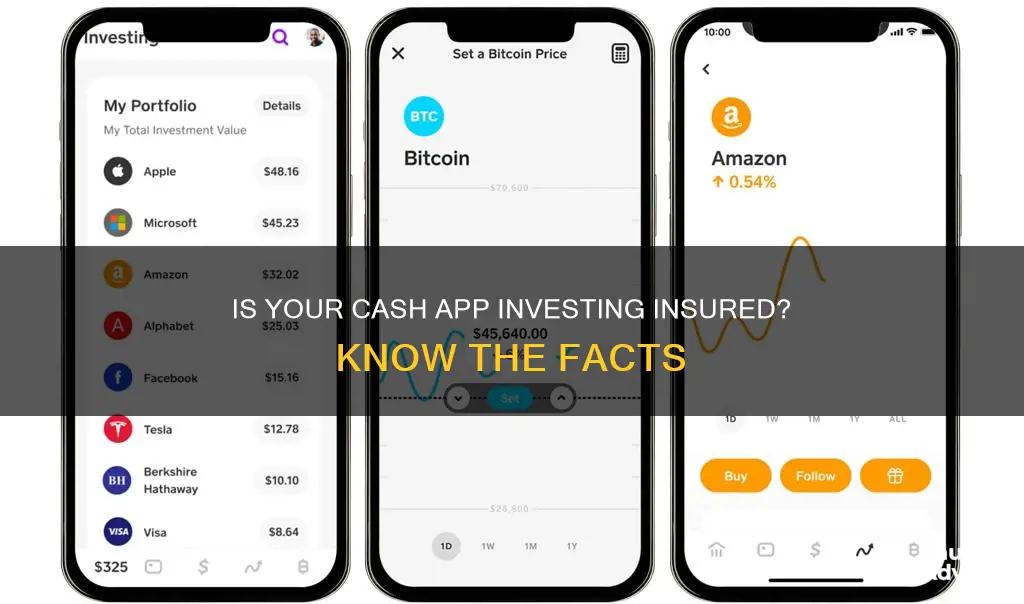
Cash App is an online banking and investing platform that offers commission-free trading of over 1,800 stocks and ETFs. It is a beginner-friendly platform for banking and investing on the go. Cash App Investing is a subsidiary of Block, Inc., formerly known as Square, Inc. While Cash App offers a range of financial services, it is not a bank. So, is investing on Cash App insured?
Cash App Investing LLC is a member of the Securities Investor Protection Corporation (SIPC). Securities in your account are protected up to $500,000. However, it is important to note that SIPC insurance does not protect against failed investments. Additionally, if you have a Cash App Card, your cash balance is FDIC-insured through partner banks, Wells Fargo and Sutton Bank, for up to $250,000 per person. Bitcoin and investing balances are not covered by FDIC insurance.
| Characteristics | Values |
|---|---|
| Cash App Card Insurance | FDIC-insured through Wells Fargo Bank, N.A. and Sutton Bank, Members FDIC, for up to $250,000 per person. |
| Bitcoin Insurance | Not covered by FDIC Insurance. |
| Stock Insurance | Protected by SIPC up to $500,000. |
| Cash App Status | Not a bank. |
What You'll Learn

Cash App Card and FDIC insurance
Cash App is a financial services platform that provides a safe space for your money. It offers advanced security features, including encryption and fraud detection technology, to protect your data and money. Cash App also provides notifications for suspicious activity and verifies your identity to ensure that your account is secure.
If you have a Cash App Card, your money is FDIC-insured through their partner banks, Wells Fargo Bank, N.A., and Sutton Bank, Members FDIC. This means that your cash and savings balances are protected by the federal government for up to $250,000 per person. FDIC insurance covers your balance in case the bank holding your funds fails. It is important to note that FDIC insurance does not protect individual transactions or cover fraud.
Additionally, Cash App Investing LLC is a member of SIPC, which insures securities in your account for up to $500,000. This includes stock balances, but Bitcoin and investing balances are not covered by FDIC or SIPC insurance.
While Cash App provides a secure platform for your money, it is not a bank. Banking services, including FDIC Insurance, are provided by Cash App's partner banks. Therefore, it is essential to understand the protections and limitations offered by Cash App and its partner institutions when using their services.
Square Cash: A Smart Investment Strategy for Beginners
You may want to see also

Cash App's security features
Cash App is a financial services platform that offers a range of security features to protect its users' money and personal information. Here are some of the key security features offered by Cash App:
Encryption and Fraud Detection Technology
Cash App employs cutting-edge encryption protocols to secure users' financial details and personal information. Any information submitted by users is encrypted and securely transmitted to Cash App's servers, regardless of the network or connection type. Additionally, Cash App uses advanced fraud detection technology to monitor transactions and identify potentially fraudulent activities.
Two-Factor Authentication (2FA)
Cash App offers two-factor authentication as an additional layer of security. This feature helps prevent unauthorized access to users' accounts.
Payment Verification
Cash App always asks users to confirm payments before sending money, especially when transferring funds to someone new or not in their contacts. This feature helps prevent accidental or unauthorized transactions.
Notifications for Suspicious Activity
When users perform sensitive actions, such as sending money internationally or logging in from a new device, Cash App sends notifications and asks security questions to confirm their identity. This helps ensure that the user's account is secure and prevents unauthorized access.
Identity Verification
Cash App requires users to verify their identities by providing personal information, such as their full name, date of birth, and Social Security Number. This helps protect accounts and prevent money laundering activities.
PCI Data Security Standard (PCI-DSS) Compliance
Cash App complies with Level 1 of the PCI Data Security Standard (PCI-DSS), the highest benchmark available. This compliance ensures that Cash App maintains a secure environment for processing and storing payment card data.
FDIC Insurance
For users with a Cash App Card, Cash App provides FDIC insurance through its partner banks, Wells Fargo Bank and Sutton Bank. This insurance covers cash and savings balances of up to $250,000 per person in the event that the bank holding the funds fails. However, it is important to note that Bitcoin and investing balances are not covered by FDIC insurance.
Transferring Cash to Fidelity Investments: A Step-by-Step Guide
You may want to see also

Stocks and SIPC insurance
Stocks are insured by the Securities Investor Protection Corporation (SIPC), which is a federally mandated, private nonprofit organisation. The SIPC was created as part of the Securities Investor Protection Act (SIPA) of 1970, which aimed to protect investors from brokerages becoming insolvent. SIPC insurance covers investors for up to $500,000 in securities and up to $250,000 in uninvested cash.
The SIPC steps in when a brokerage firm fails financially and assets are missing from customer accounts. It works to restore investors' cash and securities, having recovered billions of dollars for investors over its 50-year history.
SIPC insurance covers specific types of investments as securities, including money market mutual funds, stocks, bonds, Treasury securities, and certificates of deposit. These securities are covered under what the SIPC calls "separate capacities", which are different types of investment accounts. Some examples of separate capacities include traditional and Roth IRAs, accounts held by an executor of an estate, and accounts held by a legal guardian.
It's important to note that SIPC insurance does not cover losses due to market volatility, bad investment advice, or security breaches unless the brokerage becomes insolvent due to a hack. It also does not protect against the decline in value of securities or worthless stocks and other securities.
In the case of Cash App, a financial services platform, stocks are SIPC-insured through Cash App Investing LLC, a subsidiary of Block, Inc. Securities in customer accounts are protected up to $500,000. However, it's important to note that proceeds from the sale of stocks or ETFs are automatically transferred to the customer's Cash balance, which is not SIPC-protected but may be FDIC-protected.
How Cashing Investments Affect Debt Service Coverage
You may want to see also

Cash App's suitability for beginners
Cash App is a suitable platform for beginners looking to send, receive, save, and invest their money. The app is free to download and use, and it offers a range of features that make it a convenient and accessible option for beginners.
To start using Cash App, users need to download the mobile app and create an account. The app has a simple interface with tabs for its various services, including banking, debit card, payments, investing, and bitcoin. Users can send and receive money instantly at no cost, and there are no fees for standard transfers from a Cash App balance to a linked bank account.
One of the advantages of Cash App for beginners is the ability to set up direct deposits. This allows users to receive paychecks, tax refunds, unemployment benefits, and stimulus checks directly into their Cash App balance. Additionally, Cash App offers exclusive discounts with the Cash App Card, which can be used to save on everyday spending.
For beginners interested in investing, Cash App provides an easy way to buy, sell, and invest in stocks and bitcoin. Users can start investing with as little as $1, making it accessible for those who are new to investing. The app also offers brokerage services through Cash App Investing LLC, a member of the Securities and Exchange Commission and the Financial Industry Regulation Authority.
While Cash App is a suitable platform for beginners, it is important to note that it is not a bank. Banking services are provided through Cash App's partner banks, and the app itself is not insured by the Federal Deposit Insurance Corporation (FDIC). However, funds stored on the Cash App Card are FDIC-insured through partner banks, with coverage of up to $250,000 per account holder.
Overall, Cash App provides a user-friendly platform with a range of features that make it a good choice for beginners looking to manage their money and explore investing options.
Strategies for Cashing Out Investments: A Comprehensive Guide
You may want to see also

Cash App's rating and trustworthiness
Cash App is a financial services platform that offers a range of features, including peer-to-peer payments, direct deposits, a debit card, and investing in stocks, ETFs, and Bitcoin. It has over 50 million active users and is known for its convenience, ease of use, and low costs.
In terms of trustworthiness and safety, Cash App takes several measures to protect its users' accounts and money. It uses advanced security features, encryption, and fraud detection technology to secure users' data and transactions. Cash App also monitors accounts for suspicious activity and notifies users of any changes to their PIN or security settings. Additionally, Cash App verifies users' identities to protect their accounts and requires confirmation for payments to new recipients.
Cash App also provides FDIC insurance for cash balances up to $250,000 per person through its partner banks, Wells Fargo Bank, and Sutton Bank. This insurance covers users' deposits if the bank holding the funds fails. However, it's important to note that Bitcoin and investing balances are not covered by FDIC insurance.
While Cash App takes measures to protect its users, there have been some reports of unauthorized transactions, fraudulent activities, and issues with customer support. Reviews on Trustpilot are mixed, with some users praising the app's convenience and ease of use, while others have complained about customer service, unauthorized withdrawals, and difficulties resolving issues.
Overall, Cash App offers a range of financial services and takes measures to protect its users' accounts and transactions. However, as with any financial platform, there are risks involved, and users should carefully consider their options and stay vigilant to ensure the safety of their funds.
Cashing Out on Robinhood: A Guide to Withdrawing Your Investments
You may want to see also
Frequently asked questions
Cash App uses advanced security features to power and protect every account. It also uses encryption and fraud detection technology to make sure your data and money are secure.
If you have a Cash App Card, or are a sponsor of any active sponsored accounts, up to $250,000 of your cash and savings balances in Cash App is covered by FDIC insurance through their partner bank Wells Fargo Bank.
Yes, Cash App Investing LLC is a member of SIPC. Securities in your account are protected up to $500,000.
Cash App is safe for direct deposit. The company uses advanced encryption and fraud detection technology to keep your funds safe.
While Cash App is generally safe, it is not safer than a bank account since peer-to-peer services tend to be targeted more frequently by scammers than banks.







